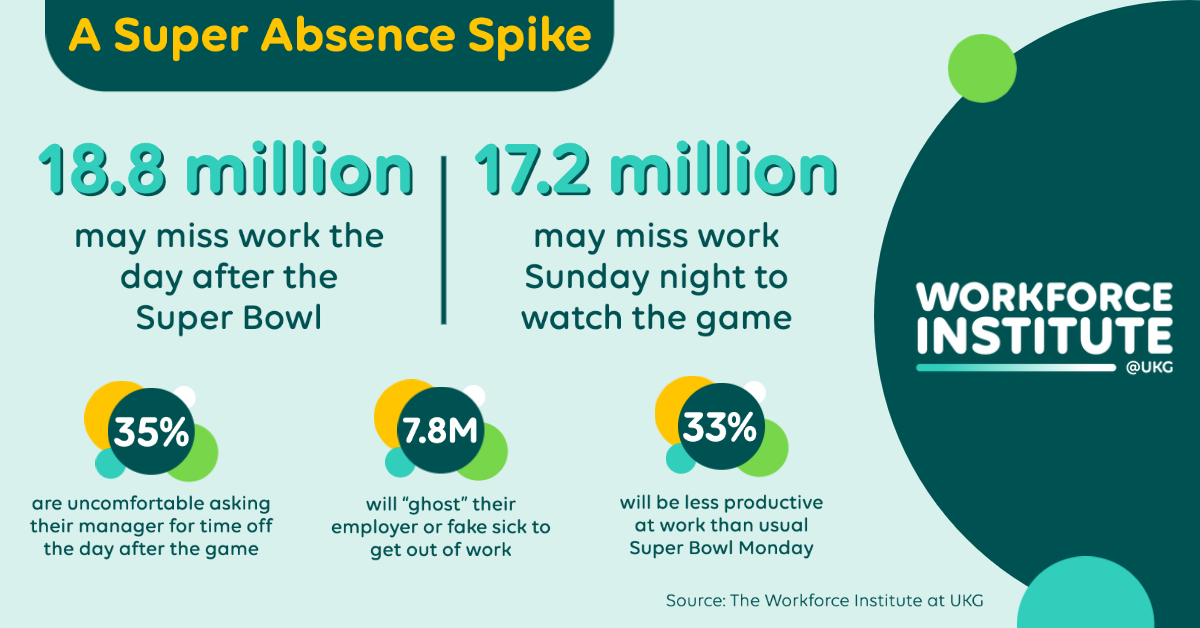
?Employers can expect more absent and tardy workers following the Super Bowl game Sunday between the Philadelphia Eagles and Kansas City Chiefs.
About one in five U.S. workers—an estimated 26.6 million people—say they are likely to miss all or part of the workday.
That includes almost 19 million employees not planning to go to work—among them more than 3 million calling in sick—and nearly 8 million who anticipate a late start to their day, according to the Workforce Institute at UKG. The institute is a part of Ultimate Kronos Group (UKG), a technology company with dual headquarters in Lowell, Mass., and Weston, Fla.
But that’s OK for some school districts in Philadelphia that have declared a two-hour late start and one that has promised a day off if the Eagles win.
“Missing at least some work on Super Bowl Monday is more prominent in cities with a team in the game, though we see a higher percentage of game-day and game-related distractions among fans of the competing teams,” said Jarik Conrad, vice president, human insights, and executive director at the Workforce Institute at UKG.

Additionally, 44 percent of Kansas City Chiefs fans and 43 percent of Philadelphia Eagles fans said they’ll be distracted at work by Super Bowl post-game highlights and conversations with co-workers, Conrad noted. By contrast, 33 percent of all U.S. employees said they’ll be less productive on Monday.
Nearly one-fourth of workers overall on the AWOL list will be managers, UKG found. Just 6 percent plan to notify their teams or direct reports they are taking time off and 5 percent plan to ghost their workplace.
The findings are from a Harris poll conducted for UKG. Among the 1,270 respondents, 74 percent work full time, 60 percent are at a physical workplace and 62 percent identified themselves as a people manager with at least one direct report.
Longtime Problem
Absenteeism or tardiness the day after the big game has long been a problem for employers, according to UKG, which has been tracking the issue since 2005.
Some people have advocated making the Monday after the Super Bowl game a paid holiday as a solution.
Two Tennessee lawmakers introduced a bill on Feb. 1 to make Super Bowl Monday a state holiday.
“We’re talking about a major hit to the workforce,” Rep. Joe Towns Jr., D-Memphis, said in a statement to Yahoo Sports, pointing to the millions of people estimated to take an approved or unapproved day off.
Employees at work on the day of the game may be less productive than usual, as nearly 22 million workers may watch or listen to the game while at work, according to UKG. An estimated 51.8 million expect they will be less productive than usual on Monday.
Hybrid and remote workers are more likely than those working onsite to work fewer hours on Monday, according to Conrad:
- 64 percent of those in a physical setting said they will work their normal hours.
- 53 percent of fully remote workers and 50 percent of hybrid workers said they will work their normal hours.
“That said, over 60 percent of workers are front-line, in-person workers, which means that the fundamental issues at play here—trust, transparency and communication—are visible in remote, hybrid, and in-person workplaces alike,” Conrad said. “It’s up to managers to build trust and practice open communication with their people in order to address this phenomenon and help promote engagement in their workplace.”
Have a Game Plan
The Workforce Institute at UKG suggests employers plan ahead and add the following strategies to their playbook:
- Know your roster.
Be aware that individuals ages 18 to 34 are more likely than other age groups to say they’ll miss work the Monday after the game (25 percent versus 17 percent of all other age groups nationally). Other age groups were 35 to 44, 45 to 54, 55 to 64, and 65 and older.
- Initiate the conversation.
And individuals ages 18 to 34 are more likely to just not show up than talk to their manager about missing work (6 percent versus 3 percent of all other age groups nationally), UKG found.
“There should be no penalty for employees requesting or taking time off, especially when it’s planned,” The Workforce Institute managing editor Brandon Bielich said in a blog post.
“If workers are feeling too afraid to chat with their managers about being out, there are likely large cracks in the culture foundation. Managers, too, aren’t having enough pep talks with their people. In our survey, only 14 percent of managers said their managers have proactively reached out about time off around the Super Bowl.”
